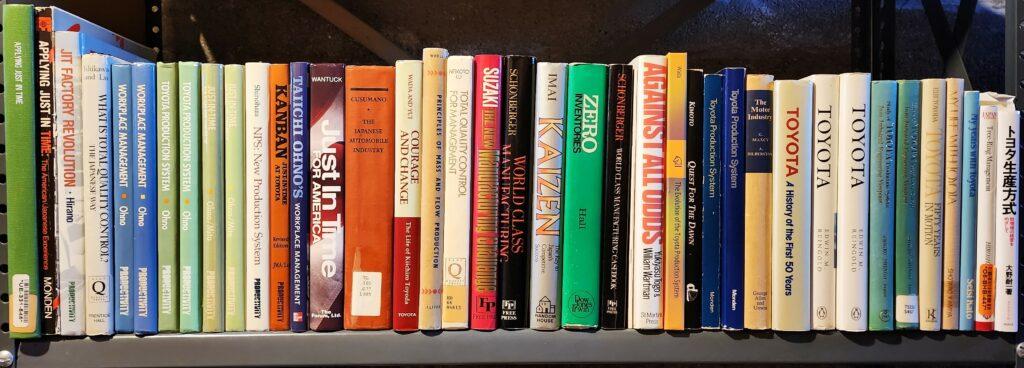Two years ago, I got rid of my extensive collection of Lean books. I donated them all to charity, some 100 books. But I did keep the books about Toyota, Toyota Production System, and important related works, most of which were published in the 1980s and 1990s. These are priceless original sources of the thinking, methods, and wisdom that created something truly original and multifaceted in their teachings about business, markets, economics, people, processes, work, teamwork, quality, cost, and so on. You can re-read these great books dozens of times and always learn something new and important.

The Lean books ended up in the used book market. I let them go because to me, most represented a pop culture form of management thinking and practice, one that soon led to the creation of Fake Lean and later, Junk Lean, despite the seriousness of the early Lean books.
As you know, many of my books have the word “Lean” in the title (also notice that none have the word “Toyota” in the title to avoid the fad or grift, depending on your viewpoint). It reflects the fact that we were all tricked, myself included, by James Womack and Dan Jones to think that Lean and TPS were the same. Well, Lean diverged from TPS bit-by-bit over the last 36 years so that today there is no resemblance between the two. But what has successfully emerged over time is the business of Lean; a Lean-Industrial Complex, a coalition of groups that share vested interests in the continuous sale of products and services, most of which you do not need.
We were tricked once about Lean being the same as TPS, and now people are being tricked again to Learn why their Lean efforts are failing. You are failing because of the first trick! So, in my mind, Lean has lost all credibility. In the meantime, it will continue to work its way through the cool-common-passé cycle.
While twelve of my books may have “Lean” in the title, I can assure you that they reflect TPS and the Toyota Way viewpoints, and what I was taught by Shingijutsu 30 years ago, including the critical thinking that comes from kaizen. Some other Lean-in-the-title books written by other authors do as well.
The books you see in the photo above are all that remain. You will notice some duplicates; books that I marked up, and a copy free of any markings. At one time I had some 85 books from the early 1900s about Scientific Management. They too are gone, donated or sold. I deeply lament the loss of those books, which I possessed for over 20 years, because they were an intimate, first-person connection to the history of progressive management. But the most important titles are in younger person’s hands now.
The Scientific Management books and other publications from that time were extraordinarily illuminating to read because they revealed how Lean has repeated the mistakes of the past. It is déjà vu all over again, but which top Lean community leaders and promoters have thought better to ignore — and worse than that, thoroughly disrespect Frederick Winslow Taylor and his associates. I loved my old Scientific Management books, just as I love the books in the photo above.
The Lean books? I don’t have much love for them. It is true that some excellent books have been written with the word “Lean” in the title. I too have learned much from them. But I did not judge any of them to be worth saving, especially the “Lean tool” books. The books have few deep insights and are not the kind that you can read again and again and learn something new.
Overall, we must realize that Lean, from the start, was a low-fidelity version of TPS, and later, The Toyota Way, and Lean’s fidelity to them has been continuously degraded as time has passed — and to a great extent it has been allowed to degrade over time, notwithstanding the brand power of classical management.
Someday, I will sell or donate the books shown in the photo above, a few of which are rare. I’m not sure when, but it will happen.
The only other books I am keeping, for now, are the 40 or so that were key to helping me write the series of six books shown below. Maybe 30 or 40 years from now, some people will see these six books as worth keeping for their thinking and wisdom in relation to what prevents progressive management, such as TPS, from flourishing. They are the antithesis of my TPS books, and thus equally valuable.

